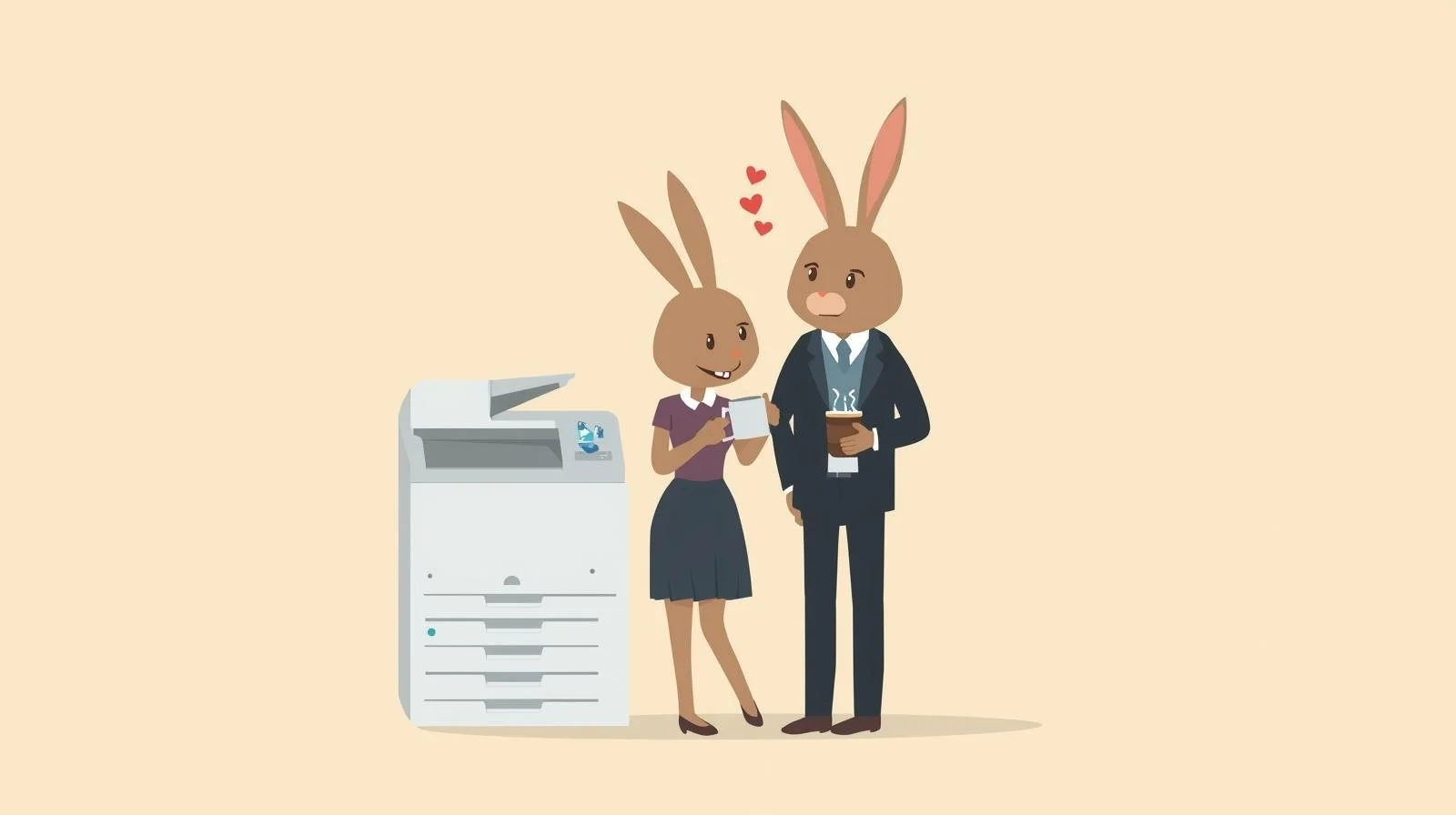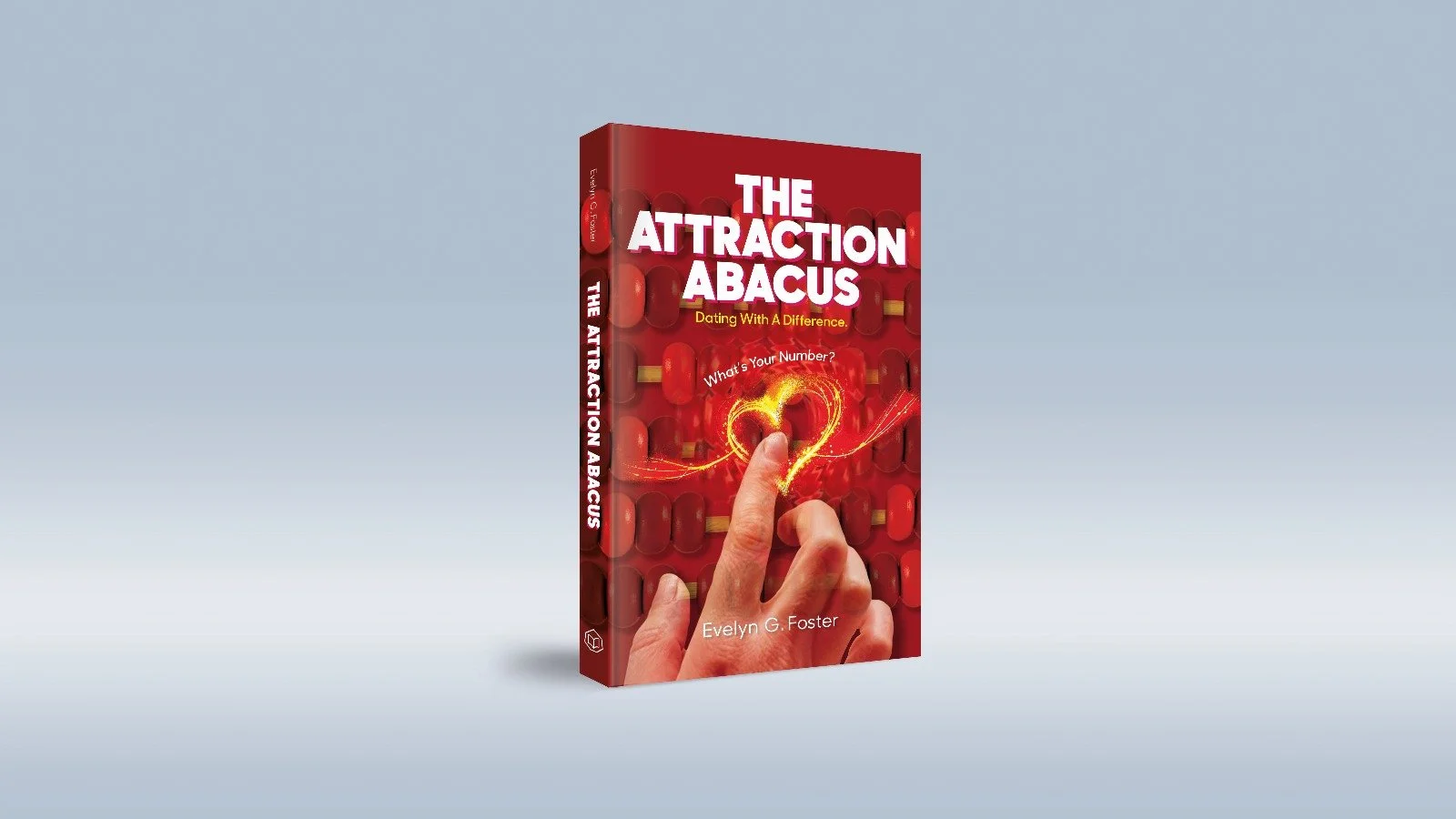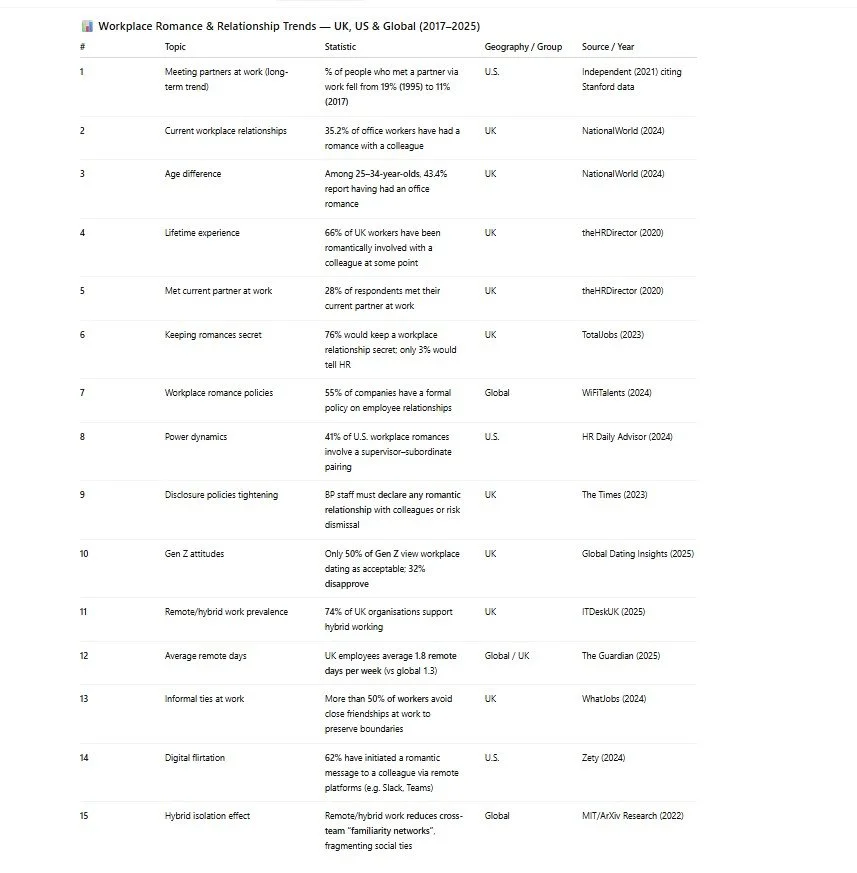💔 The Gentle Fade of the Workplace Romance
Are workplace romances in decline?
Once upon a time, the office was as much a dating venue as a place to earn a living. People met at the photocopier, flirted over lunch, and bonded on late projects. For decades, the workplace offered the perfect mix of proximity, familiarity, and shared purpose, the three classic conditions for attraction.
But today, the office romance is gently fading…
Are hybrid working, dating apps, and new boundaries changing how we fall in love at work?
While 19% of couples in the 1990s met at work, by 2017 that had fallen to 11%. Even though 35% of British office workers say they’ve dated a colleague at some point, younger generations are far less open to it. Half of Gen Z employees now say workplace dating is unacceptable, and nearly a third actively disapprove. What happened to love at work?
Remote work rewrote the rules of connection
The biggest factor is physical absence. In the UK, 74% of organisations now support hybrid working, and employees average almost two days a week from home. Remote work offers flexibility, but at a cost to social chemistry.
Those casual, everyday encounters that once sparked attraction have largely vanished. You can’t flirt on Teams in quite the same way you can at the coffee machine. Research shows that remote work fragments “familiarity networks” inside organisations, reducing cross-team interaction and casual bonding. And without co-presence, attraction rarely has the soil to grow.
Many employees also prefer this distance. Over half of UK workers say they avoid close friendships at work to preserve personal boundaries. The same cultural shift that helps prevent burnout also quietly reduces the chances of romance.
Love has moved online
At the same time, technology has created a vast new marketplace for love outside work. Dating apps like Tinder, Bumble, and Hinge have made it easier than ever to meet people beyond one’s office or social circle.
That abundance has reshaped expectations. Why risk the awkwardness, and potential HR drama, of dating a colleague when you can meet hundreds of people with a swipe? The workplace is no longer the main meeting ground; it’s one option among many. This shift also mirrors a deeper cultural change. As work and private life have become more distinct, employees increasingly see the office as a professional zone rather than a social one. Dating apps may have killed the water-cooler flirtation as effectively as Zoom killed the commute.
Boundaries, policies, and generational caution
Younger workers, shaped by the #MeToo movement and growing awareness of power dynamics, are more cautious about mixing personal and professional relationships.
A 2025 survey found that only half of Gen Z workers view workplace dating as acceptable. Many fear reputational damage, awkwardness after breakups, or even disciplinary consequences. And they’re not wrong to be wary: about 55% of companies now have formal policies governing workplace relationships, and some, like BP in the UK, require employees to declare any romantic involvement or risk dismissal.
As a result, love hasn’t vanished from the office, but it’s gone underground. Three-quarters of UK workers in relationships say they would keep them secret from HR. The modern office romance is quieter, more deliberate, and far more cautious.
The digital office flirtation
Even so, attraction always finds a way. In one U.S. survey, 62% of employees admitted to sending a romantic or flirtatious message to a colleague via Slack or Microsoft Teams. Remote work hasn’t ended office romance, it’s simply moved it online.
But digital flirtation brings new risks: messages can be saved, misinterpreted, or shown to others. What was once a private smile by the coffee machine can now be a screenshot in someone’s inbox. The intimacy of the office has become a risk-managed digital exchange.
What we gain. And what we lose…
The decline of workplace romance isn’t entirely bad news. Fewer in-office relationships mean fewer conflicts of interest, awkward breakups, or accusations of favoritism. Many professionals welcome the clarity of keeping their careers separate from their personal lives.
But there’s also a loss. As work becomes more transactional and less social, we may miss out on the friendships and emotional bonds that once made workplaces feel alive. Strong informal ties boost belonging, morale, and retention. Romance was once part of that social glue.
Hybrid and remote work have given us flexibility and freedom, but perhaps also a thinner sense of connection. The modern office may be safer, more professional, and more efficient, but it’s also lonelier.
Love isn’t gone. It’s just transformed…
The traditional office romance is no longer the default, but that doesn’t mean it’s extinct. As dating-app fatigue grows and hybrid workers crave real-world connection, we may yet see a small revival of organic, in-person attraction. The difference is that modern love at work will be intentional, transparent, and negotiated. Not born of chance but of choice.
For now, though, the age of the workplace romance belongs to history. Love hasn’t left the office entirely. It’s just clocked out early, logged in remotely, and started swiping elsewhere.
These numbers paint a nuanced picture. Romantic involvement among colleagues remains common, but openness has declined. Policies have tightened, and generational attitudes are shifting toward professionalism and privacy. Meanwhile, the spread of hybrid work and digital communication has changed how people connect, from spontaneous in-person exchanges to intentional, text-based interactions.
Read more about the data at the bottom of this article.
Fancy reading an amusing workplace rom com? The Attraction Abacus might be just the book for you. Click on the link below.
The data (credit: ChatGPT)



